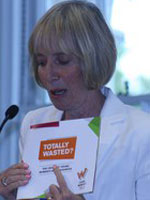Dr. Carole Easton began her career as a child and family psychotherapist in the NHS. She has extensive experience in the voluntary sector as Chief Executive of Cruse Bereavement Care, ChildLine and CLIC Sargent (caring for children with cancer). She is now Chief Executive at Young Women’s Trust, supporting and representing young women at risk of lifelong financial and emotional insecurity.

On 27th July 2015 the Department for Education and Nick Boles MP launched a new scorecard to rate council’s performance in relation to young people not in education, employment or training (NEET).
More needs to be done to help NEETs break out of the long cycle of moving between low pay and no pay
On 27th July we heard from Skills Minister Nick Boles that local councils are to be the subject of annual ‘at-a-glance’ scorecards. This unconventional version of top trumps will rate each council on their attempts to reduce the number of 16-19 year olds who are not in education employment and training (NEET).
For many young people who find themselves NEET it is just the start of a long cycle of moving between low pay and no pay which keeps them trapped in poverty and disadvantage. It is therefore encouraging that the Government seems to be acknowledging that more needs to be done to help young people break free from this cycle. However, if these scorecards are to be more than a good PR exercise they need to be redesigned to fully reflect the challenges facing young people.
Broader focus needed
Firstly the scorecards need to move away from their narrow focus on the under 20s. In their current form, councils’ performance will be artificially boosted by the recent raising of the participation age. Pupils who left year 11 in the summer of 2014 or later must continue until at least their 18th birthday in full-time education, an apprenticeship or traineeship, or part-time education combined with work or volunteering. These changes make it more likely that 16-18 year olds will remain in education regardless of any efforts councils are likely to make.
This masks the good work being done by some councils to support young people as well as increasing the opportunities for underperforming authorities to point to this natural decrease as false evidence of their success. Being NEET is not just an issue for 16-18 year olds. Figures from the ONS show that in the first quarter of 2015, 3.6% of 16-17 year olds were NEET. But at the same time, 889,000 18-24 year olds were NEET. That’s 15.4% of that age group. Councils need to be able to show what they are doing to support young people across the entirety of that age group.
Recognising gender as a factor
Most importantly, we need to recognise gender as a factor. There are currently over 100,000 more young women aged 16-24 NEET compared to young men of the same age. Young women also spend longer being NEET, an average of 36 months compared to 24 for months for young men. Sadly this period of unemployment leaves long term scarring, with women who have spent time unemployed before their 25th birthday earning as much as £2,000 less per year than other women by the time they are 34.
Young women and young men have very different experiences of being NEET and the support they need to make the most of their potential will also be different. If the Government is serious about harnessing the vast potential of young people it needs to look beyond a narrow set of indicators for local authorities and fundamentally change the way it addresses young women’s worklessness.
http://www.youngwomenstrust.org/
https://www.facebook.com/youngwomenstrust





